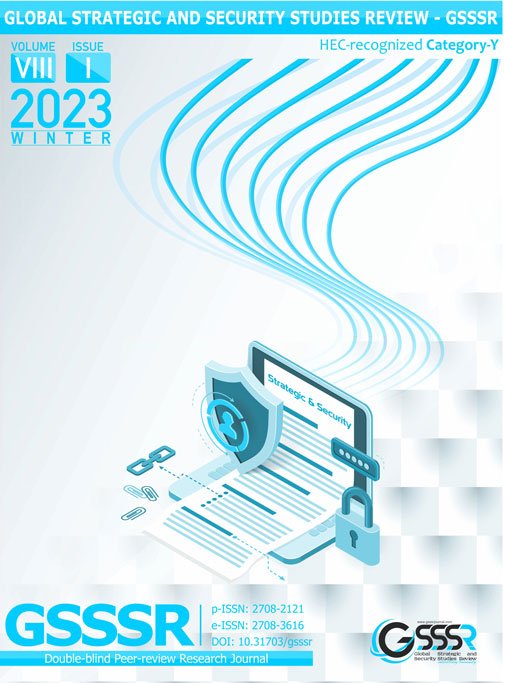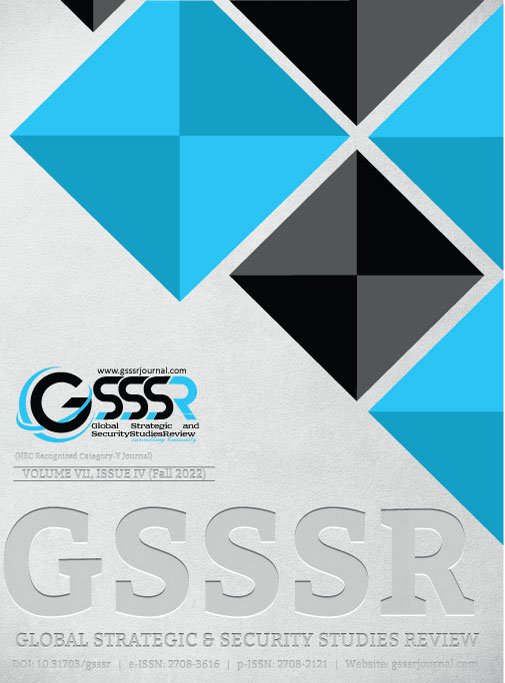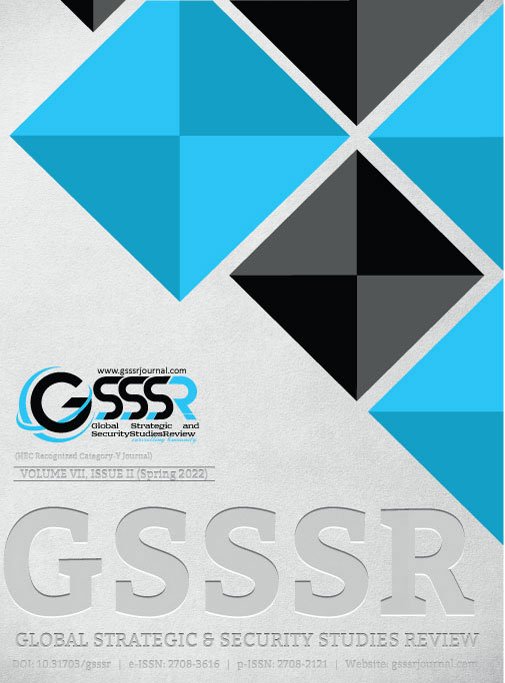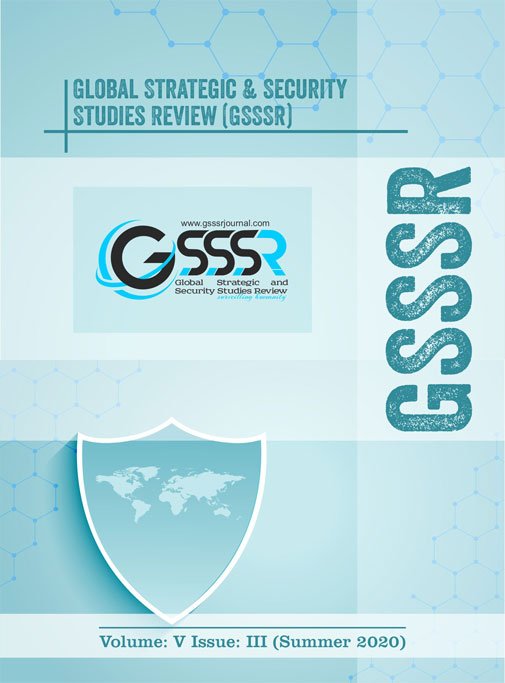01 - Pakistan and the Nuclear Non-Proliferation Regime
http://dx.doi.org/10.31703/gsssr.2021(VI-IV).0110.31703/gsssr.2021(VI-IV).01 Published : Dec 2021
-
The arrival of nuclear weapons was detrimental in changing the nature of warfare; during WWII, we used nuclear weapons on two Japanese cities. The catastrophic effect of nuclear weapons made the pioneers apprehensive about the spread of nuclear technology across the globe. The Nuclear Non-Proliferation Regime (NNPR) is a set of international rules, norms, initiatives, agreements, arrangements, bil... Details
-
Pakistan, Nuclear Non-Proliferation Regime (NNPR), Missile Technology Control Regime
-
(1) Anum Riaz
Research Scholar, Department of Political Science, Bahauddin Zakariya University, Multan, Punjab, Pakistan.
(2) Muqarrab Akbar
Chairman, Department of Department of Political Science, Bahauddin Zakariya University, Multan, Punjab, Pakistan
02 - Temporary Displaced Persons (TDPS) from North Waziristan Agency (NWA) in Bannu:
http://dx.doi.org/10.31703/gsssr.2021(VI-IV).0210.31703/gsssr.2021(VI-IV).02 Published : Dec 2021
-
Since its inception, Pakistan has always remained an important player in the South Asian politics due to its geographical location and strategic position. The war against terror affected the whole world generally and South Asia particularly. After the 9/11 attacks, the United States came into Afghanistan along with allied forces which pushed militants from Afghanistan to take refuge in near by pla... Details
-
North Waziristan Agency, TDPs Crises, Relief Work, Military Operations, Terrorism
-
(1) Najbud Din
PhD Scholar, Qurtaba University of Science and Technology Peshawar, KP, Pakistan.
(2) Khan Faqir
Assistant Professor, Department of Pakistan Study Centre, University of Peshawar, KP, Pakistan.
03 - Iranian Perspective for a Nuclear Free Zone in the Middle East: Challenges and O
http://dx.doi.org/10.31703/gsssr.2021(VI-IV).0310.31703/gsssr.2021(VI-IV).03 Published : Dec 2021
-
Iran has remained a controversial topic for many decades among the international actors as well as some regional actors of the Middle East. The nuclear program of Iran has been the center of U.S. attention, and thus Iran underwent various sanctions. It was not until 2015 that the doors to U.S. cooperation opened for Iran, only to be closed two years later in 2017 by U.S. President Donald Trump.Thi... Details
-
Nuclear Free Zone, Neo-Liberalism, Iran, Middle East, U.S., Israel
-
(1) Rida Tanvir
Ph.D. scholar, Quaid I Azam University Islamabad/Lecturer, Department of International Relations, National University of Modern Languages, Islamabad, Pakistan.
(2) Qandil Abbas
Assistant Professor, School of Politics and International Relations, Quaid I Azam University Islamabad, Pakistan.
(3) Waseem Ishaque
Assistant Professor, Department of International Relations, National University of Modern Languages, Islamabad, Pakistan.
04 - External Dynamics in China's Afghan Policy Behavior
http://dx.doi.org/10.31703/gsssr.2021(VI-IV).0410.31703/gsssr.2021(VI-IV).04 Published : Dec 2021
-
As the US leaves Afghanistan, China rushes to fill the void. The transformation in China's foreign policy behavior towards Afghanistan is somewhat an aberration from historical trends. Now, growing bilateral relations between China and Afghanistan are making policy experts surprised to what is behind this recent diplomatic push up of China. The paper analyses three external factors shaping China's... Details
-
China's Afghan Policy; Indian Influence; Withdrawal of the US-led forces; Regional countries; South Asia
-
(1) Muhammad Nauman Akhter
PhD International Politics, Shandong University, China.
05 - The Latent Operational Sway of Modern Indian Conventional Weapons on the Armed F
http://dx.doi.org/10.31703/gsssr.2021(VI-IV).0510.31703/gsssr.2021(VI-IV).05 Published : Dec 2021
-
Attaining and maintaining operations security remains the primary objective of armed forces on modern battlefields. Due to their flexibility in employment, conventional weapons are the true weapons of war and warfare, and in turn, significantly affect the operational environment based on their offensive as well as defensive capabilities. South Asia being a nuclear flashpoint is still characterized... Details
-
Operations Security, Conventional Warfare, T-90S, S-400, Rafale, India, Pakistan
-
(1) Muhammad Ali Baig
Research Associate, Institute of Strategic Studies Islamabad (ISSI), Pakistan./ Ph.D. Scholar, School of Politics and International Relations (SPIR), Quaid-i-Azam University (QAU), Islamabad, Pakistan

 Volume X, Issue I (Winter 2025)
Volume X, Issue I (Winter 2025)  Volume IX, Issue III (Summer 2024)
Volume IX, Issue III (Summer 2024)  Volume IX, Issue II (Spring 2024)
Volume IX, Issue II (Spring 2024)  Volume IX, Issue I (Winter 2024)
Volume IX, Issue I (Winter 2024)  Volume VIII, Issue IV (Fall 2023)
Volume VIII, Issue IV (Fall 2023)  Volume VIII, Issue III (Summer 2023)
Volume VIII, Issue III (Summer 2023)  Volume VIII, Issue II (Spring 2023)
Volume VIII, Issue II (Spring 2023)  Volume VIII, Issue I (Winter 2023)
Volume VIII, Issue I (Winter 2023)  Volume VII, Issue IV (Fall 2022)
Volume VII, Issue IV (Fall 2022)  Volume VII, Issue III (Summer 2022)
Volume VII, Issue III (Summer 2022)  Volume VII, Issue II (Spring 2022)
Volume VII, Issue II (Spring 2022)  Volume VII, Issue I (Winter 2022)
Volume VII, Issue I (Winter 2022)  Volume VI, Issue IV (Fall 2021)
Volume VI, Issue IV (Fall 2021)  Volume VI, Issue III (Summer 2021)
Volume VI, Issue III (Summer 2021)  Volume VI, Issue II (Spring 2021)
Volume VI, Issue II (Spring 2021)  Volume VI, Issue I (Winter 2021)
Volume VI, Issue I (Winter 2021)  Volume V, Issue IV (Fall 2020)
Volume V, Issue IV (Fall 2020)  Volume V, Issue III (Summer 2020)
Volume V, Issue III (Summer 2020)  Volume V, Issue II (Spring 2020)
Volume V, Issue II (Spring 2020)  Volume V, Issue I (Winter 2020)
Volume V, Issue I (Winter 2020)  Volume IV, Issue I (Fall 2019)
Volume IV, Issue I (Fall 2019)  Volume III, Issue I (Fall 2018)
Volume III, Issue I (Fall 2018)  Volume II, Issue I (Fall 2017)
Volume II, Issue I (Fall 2017)  Volume I, Issue I (Fall 2016)
Volume I, Issue I (Fall 2016)